This article is part of the 31 Days of Pinterest Hacks series. Find the main page for this series here.
Books. Books. And more books. If you walk into our home, that’s what you’ll find. I’ve been collecting children’s books since my first year as a teacher, so our home is exploding with books. I was subscribed to a mail-in Book-of-the-Month-Club (remember those?) Books arrived at my door on a monthly basis, and I couldn’t return them once they were in my hands.
While books are fantastic, some books are better than others. In this article, I share just what those are and why.
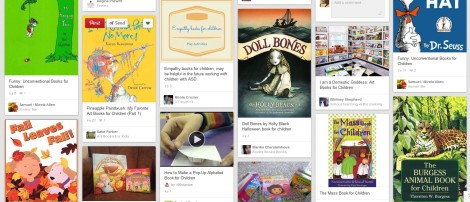
There are tons of book suggestions for children pinned on Pinterest. What’s best for the child you support?
Why some books may be a challenge for neurodivergent and disabled children
- Children who like to mouth things may also be tempted to chew a book making it a choking hazard.
- Books with paper pages are difficult to manipulate for children who require fine motor support.
- Some children may have zero interest in books, not because they can’t read.
- Children with shorter attention spans may not stick with a book for very long.
Suggestions for books
- Fabric and loop and hook books. For the chewer and the biter, use fabric books. Make them yourself if you are creative.
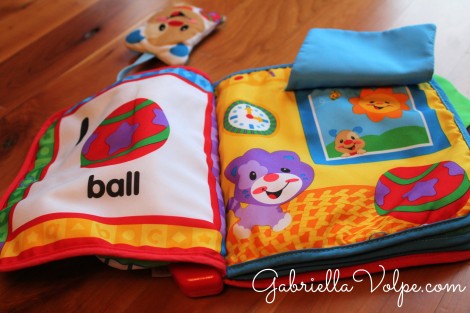
This fabric books has flaps as well as sounds. I was able to remove the battery piece to throw this in the wash when the book became too dingy. That’s the added perk with fabric books: washability!
- Musical books. Musical books like the one in the image below, are often quite sturdy. My son took to this book early because he could finally turn some pages himself. e still loves to flip through this one.
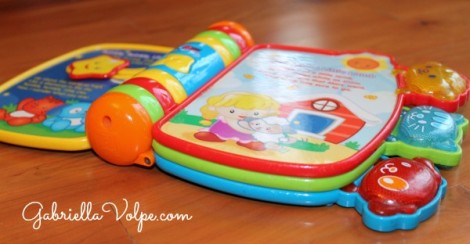
Musical book
- Interactive books. Interactive books are great for practicing using the pointer finger. Children usually stick with interactive books for longer than other books, so it’s an excellent place to start with some children.
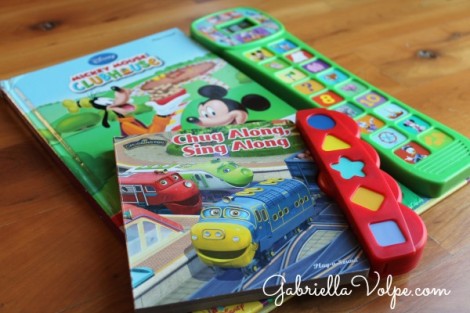
Interactive books are great motivators. The downside is that once the battery wears out or the whole thing malfunctions, the interest in the book just as a book isn’t as appealing.
- Board books. Since board books are thick and sturdy, get your hands on these. Find board books with tabs for easy page-turning!
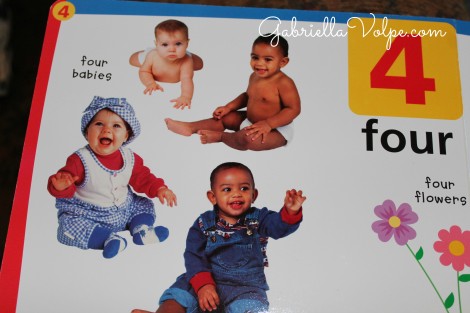
Board books with authentic images of babies or children get kids to notice the pages.
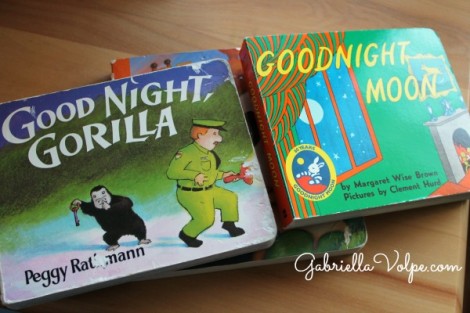
Board books make for easy flipping. However, if these are still too difficult for the child to manipulate on their own, find books with tabs (see below) or add tabs to the books yourself.
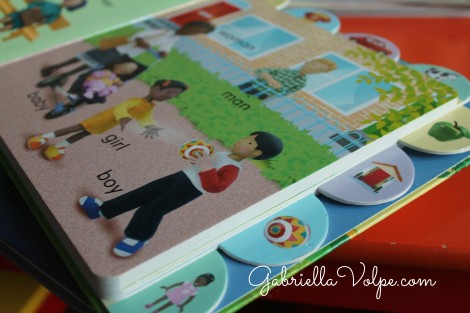
Board book with tabs. This one is also a word book we love for its simplicity and vocabulary building.
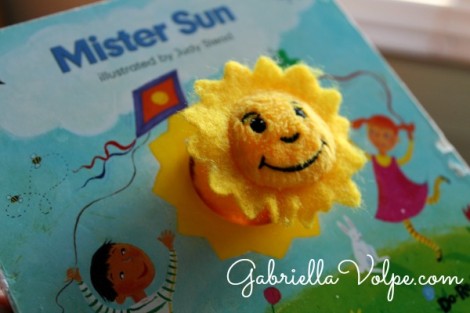
This board book also has a built-in finger puppet that peeps through each page. It’s a great way to get a child to remain interested in books, but once they’re able to, they can poke their finger behind there to control the puppet themselves. Perfect for fine motor practice!
- Flip and pop-up books. Flip and pop-up books are often board books, too. They add an extra element of interest and often appeal to children who don’t easily take an interest in books. You don’t have to read these books. Use them as motivation!
- Textured books. What a great way to get those sensory sensitive children to interact with different textures! Do it through books!
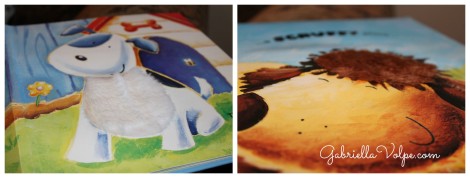
This book has fuzzy pages, sticky pages, feather pages, etc. Great for sensory integration and fine motor practice.
- Picture books. These are paperback books with glorious images. I recommend beginning with repetitive or predictable books (ex: The Three Little Pigs, and Brown Bear, Brown Bear) as well as with cumulative books (ex: I Know an Old Lady, and Henny Penny). It not only piques their interest, but it helps children engage with the story because they know what will come next. Here is a list of types of picture books you can begin collecting and why:
-
- Repetitive/predictable – engages the child
- Cumulative – engages the child
- Wordless – allows child or adult to create the story
- Traditional (fairytales, fables, folktales, myths and legends) – great for storytelling without the books!
- Rhymes and poetry– help with language building
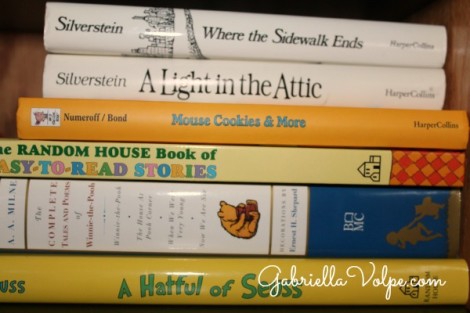
Rhymes, poetry, short stories, etc.
- Alphabet and number books. Great for children who are ready to learn their letters and numbers.
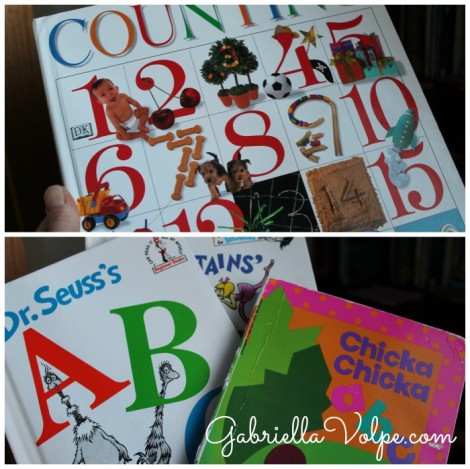
We own a great collection of ABC and 123 books.
- Informational books. The realistic images are usually stunning, even if the book is too advanced for the child.
- Themed books. Use as supplements to educational units
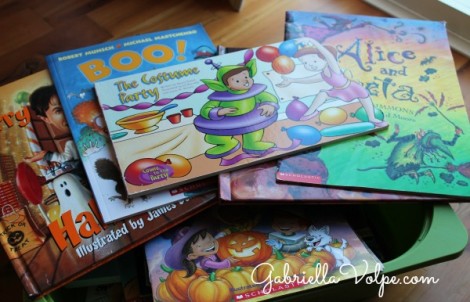
I like to keep a bin of our monthly themed books on the floor where my son can get to them. These are Halloween and Autumn books.
- Big books. Oversized books pique a child’s interest and make story-sharing fun!
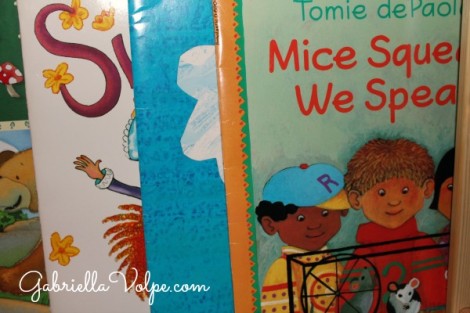
Big books are exciting for children and adults alike. Who doesn’t like a book in extra-large?
- Chapter books. Use chapter books for children who are at this reading level. If they are below the reading level, but have the attention span, read aloud to your child. Collect fiction as well as non-fiction.
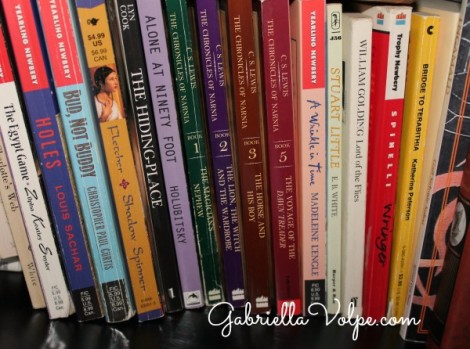
This is my collection of chapter books I’ve purchased over the years. Find books in a genre the child will enjoy for read-aloud. I don’t intend to read these to my son for a very long time. But, while feeding him, I read from The Secret Garden in the very early stages of his life.
- Graphic novels. For children who are struggling readers, take a look at graphic novels. The illustrations and shorter texts make reading appealing.
- Audiobooks. I have a personal love affair with audiobooks and podcasts myself. It allows me to multitask while enjoying a good book. Not only are they affordable, but they can be transported and listened to repeatedly. Great for kids who need reading support.
- Online books. Don’t forget that you can interact with books through a computer or tablet! Some kids love that they can more easily control books this way, but also that the books can be read to them even when the adults are tired!
Literature Resources
- Lil Readers Book Club– (Affiliate link) Inspire a life-long love of reading. A new theme is sent out each month by Subscription Box Kids.
- Epic Books – (Affiliate link) Instant access to thousands of high-quality books for kids 12 and under.
- BookOutlet– (Affiliate link) Discounted books for the entire family!
Related Articles

0 Comments